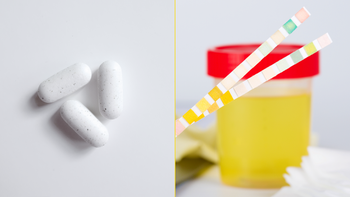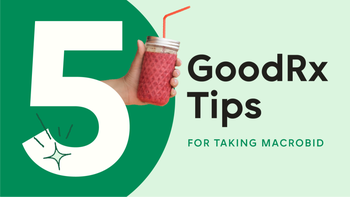
10 Nitrofurantoin Side Effects You Should Know About
Key takeaways:
Nitrofurantoin (Macrobid, Macrodantin, Furadantin) is an antibiotic used to treat or prevent urinary tract infections. Common nitrofurantoin side effects include nausea, fatigue, and a loss of appetite.
Less common nitrofurantoin side effects include dizziness, headache, and diarrhea. Hair loss is also possible.
Rare but serious side effects include nerve pain, lung reactions, and liver problems. There’s a higher risk of serious side effects the longer you take nitrofurantoin.
Access savings on related medications
Table of contents

If you have a urinary tract infection (UTI), chances are you want treatment as soon as possible. Nitrofurantoin (Macrobid, Macrodantin, Furadantin) is a common antibiotic used to treat and prevent UTIs. It was first approved in the U.S. in the 1950s, but it’s still very effective and widely used today — with over 3 million prescriptions filled for it each year.
An advantage of nitrofurantoin over other antibiotics is that it concentrates in your urine to fight the bacteria in your urinary tract. It doesn’t stay in the bloodstream the way other antibiotics do. So it works quickly and generally causes fewer side effects, too.
But even though nitrofurantoin is well-tolerated by most people, there are still some side effects to be aware of when taking it.
Search and compare options
Nitrofurantoin side effects at a glance
Below are the mild and serious nitrofurantoin side effects reported by people taking it in clinical studies. Keep in mind that you may experience side effects not listed here. It’s always best to touch base with a healthcare professional if any side effects are bothersome or concerning.
Mild nitrofurantoin side effects include:
Brown urine
Nausea and vomiting
Headache
Low appetite
Flatulence (passing gas)
Dizziness or vertigo
Drowsiness
Weakness
Stomach pain
Diarrhea
Hair loss
Rare but serious nitrofurantoin side effects include:
Trouble breathing
Lung reactions
Liver problems
Nerve problems
Allergic skin reactions
Clostridium difficile diarrhea
Hemolytic anemia (low red blood cells)
Let’s take a closer look at 10 nitrofurantoin side effects and how to manage them.
What does a UTI feel like? Read first-hand accounts to help you know what to look for and when to seek treatment.
How fast does Macrobid start working? Learn the answers to this and more nitrofurantoin FAQs.
What does Macrobid interact with? Here’s a list of medications and foods to avoid while you’re taking nitrofurantoin.
1. Brown urine
Nitrofurantoin is concentrated in your urine. And in some cases, it may turn your urine a brown color soon after you start taking it. This isn’t anything to be concerned about, and your urine color should return to normal once you’ve finished your course of treatment.
Keep in mind that other things can cause brown urine. One of these is liver problems, which can also be a nitrofurantoin side effect (more on that later). So if the brown urine doesn’t go away, or you also have muscle aches, confusion, or fatigue, reach out to your prescriber right away.
2. Nausea and vomiting
Nausea and vomiting are common side effects of nitrofurantoin. They can be uncomfortable, but they’re often easily managed at home.
Some ways to deal with nausea include:
Take nitrofurantoin with meals. Food may help with nausea, and it also helps your body absorb nitrofurantoin better.
Eat bland foods. Foods like potatoes and eggs are gentle on your stomach. Avoid spicy or greasy foods and drinks with caffeine — they’re hard on your stomach and can make nausea worse.
Stay hydrated. Dehydration can worsen nausea. Water or drinks with electrolytes help keep you hydrated.
Keep in mind that nausea and vomiting are less common with Macrobid (nitrofurantoin monohydrate / macrocrystals) than with other types of nitrofurantoin. It’s formulated to be easier on your stomach.
If nausea is severe or you’re vomiting often, contact your prescriber. They can see if there’s something else causing your symptoms and decide on the best treatment option moving forward.
3. Loss of appetite
Another possible nitrofurantoin side effect is a loss of appetite. It’s common to feel less hungry when you’re sick. And sometimes nitrofurantoin can upset your stomach or make you gassy, which can also reduce your appetite. Once you’ve completed your course of nitrofurantoin and you no longer have a UTI, your appetite should return to normal.
In the meantime, try eating several smaller meals throughout the day instead of two or three large ones. Focus on nutrient-rich food that’s easy on the stomach, such as eggs, yogurt, and soup. This will help make sure you’re providing your body with the nutrients it needs to fight your infection.
4. Dizziness and fatigue
You may feel dizzy or weak while taking nitrofurantoin. UTIs can also make you feel this way, especially if you’re over 65 years of age. So it may be hard to tell exactly what’s causing these side effects.
Regardless, staying hydrated and eating regularly can help keep your energy up and lessen the chance of these side effects. It’s also a good idea to avoid alcohol and ensure you’re getting plenty of sleep to help your body heal.
If dizziness worsens or you’re unable to perform normal daily activities, it’s best to seek medical care. It could be a sign that nitrofurantoin isn’t working properly to treat your UTI or that your infection has worsened.
5. Diarrhea
Nitrofurantoin can also cause diarrhea in some cases. This happens because nitrofurantoin may kill off some of the healthy bacteria in your gut along with the bacteria causing your UTI. Any diarrhea is usually mild and will go away once you’re finished taking nitrofurantoin.
Some ways to manage diarrhea include:
Following the BRAT diet (bananas, rice, applesauce, toast)
Taking a probiotic or eating yogurt with live cultures
Drinking plenty of fluids to help prevent dehydration
Taking over-the-counter (OTC) medications, such as loperamide (Imodium A-D)
Like most antibiotics, nitrofurantoin can cause an infectious diarrhea called Clostridium difficile colitis (“C.diff”), but this is rare. You’re at higher risk for developing a C.diff infection during your course of nitrofurantoin and for a couple of months after completing it. And it’s more likely if you’re taking nitrofurantoin long term to prevent UTIs.
Symptoms of C.diff include:
Severe diarrhea
Fever
Nausea
Loss of appetite
Stomach pain and cramping
C.diff is a serious infection that can lead to sepsis, kidney failure, or even death if it isn’t treated. If you experience any of the above symptoms, contact your prescriber or seek emergency care right away.
6. Headache
You may experience a headache when taking nitrofurantoin. Dehydration and hunger can also cause headaches. So be sure you’re eating and drinking enough while taking nitrofurantoin to help prevent them.
If you experience a headache, gentle stretching, yoga, or a short nap may help. If needed, take an OTC pain reliever such as acetaminophen (Tylenol) or ibuprofen (Advil, Motrin). Just check with your pharmacist first to make sure they’re a safe option for you.
If your headache is severe or won’t go away, check in with your prescriber. There may be something else causing it that requires additional care.
7. Hair loss
Hair loss (alopecia) is another rare nitrofurantoin side effect. Hair on your pillow, in your shower drain, or more shedding when brushing your hair are all signs that you may be experiencing hair loss.
Hair loss due to nitrofurantoin is temporary and should stop after you finish taking it. However, it may take some time for your hair to grow back.
If you’re taking nitrofurantoin long term and hair loss becomes an issue, talk with your prescriber. They may switch you to a different antibiotic or prescribe a medication to help with hair loss.
8. Nerve pain
Nerve pain (peripheral neuropathy) is a rare side effect of nitrofurantoin. Nerves carry messages between your brain, spinal cord, and body. When they’re damaged, nerves can’t send and receive messages properly, and this may result in pain.
Symptoms depend on what nerves have been damaged and how many. You may notice tingling, burning, or numbness in your arms or legs. But in some cases, the pain can be severe. And it may not go away, even if you stop taking nitrofurantoin.
People with diabetes, anemia, or trouble with their kidneys are at an increased risk of developing nerve pain while taking nitrofurantoin. So be sure to let your prescriber know if you’re living with one of these health conditions. In many cases, it may still be fine for you to take nitrofurantoin. But your prescriber will weigh the risks based on your individual health.
9. Lung reactions
Lung reactions are a serious but rare nitrofurantoin side effect. They occur in roughly 1 of every 1,000 people who take it. Symptoms include:
Cough
Trouble breathing (especially when lying down)
Muscle pain
Fever and chills
Like a typical allergic reaction, lung reactions can happen when you first start taking nitrofurantoin. But they can also happen weeks to months after you start the medication. And lung reactions that happen later often don’t cause a fever. So it may be easy to miss the connection between your symptoms and nitrofurantoin.
Once you stop taking nitrofurantoin, your lungs should begin to heal. In most cases, this happens quickly. But sometimes, it may take time for your lungs to return to normal. And in rare cases, your lung damage may never fully go away. The sooner you catch a nitrofurantoin lung reaction, the better. So if you start having trouble breathing, chest pain, or a chronic cough while taking nitrofurantoin, contact your prescriber right away.
10. Liver problems
Liver problems are another rare side effect of nitrofurantoin. Like lung reactions, they can also be either acute or chronic.
Acute liver problems from nitrofurantoin typically happen within days to weeks of taking nitrofurantoin. Common symptoms include a fever and skin rash. Your skin or the white parts of your eyes may also appear yellow due to a condition called jaundice.
If you’re taking nitrofurantoin long term to prevent UTIs, chronic liver problems are also possible. It can take months to years to develop, so your risk goes up the longer you take nitrofurantoin.
Symptoms of chronic liver damage include:
Feeling tired or weak
Jaundice
Dark urine (keep in mind nitrofurantoin can also cause this)
If you develop any signs and symptoms of liver damage while taking nitrofurantoin, seek medical care right away. It should resolve on its own once you stop taking nitrofurantoin, but in some cases it can take up to 6 months. And rarely, chronic liver damage can last even longer.
Frequently asked questions
Most people think of an antibiotic’s “strength” in terms of its effectiveness and potential side effects. Nitrofurantoin is very effective at treating most UTIs. It’s concentrated in the urine, not the bloodstream. So it typically causes fewer side effects and is less likely to cause resistance (when a bacteria becomes immune to an antibiotic) than other antibiotics.
But nitrofurantoin is not effective for more serious kidney or bladder infections. And it won’t treat infections outside the urinary tract, such as ear or sinus infections.
It’s best to take nitrofurantoin with a meal or snack. This helps your body absorb it better and lessens the chance of nausea. But if you’re treating a UTI, certain foods and drinks can aggravate your symptoms. So it’s a good idea to avoid acidic items, such as tomatoes and citrus fruits or juices. Spicy foods, artificial sweeteners, and large amounts of caffeine can also be an issue.
Yes, nitrofurantoin is considered a first-choice option for treating UTIs in people aged 65 years and older with normal kidney function. But it shouldn’t be prescribed if your kidney function is impaired.
Nitrofurantoin also shouldn’t be used to prevent UTIs in this age group. That’s because there’s a higher risk of serious side effects in elderly people taking long-term nitrofurantoin. This includes nerve damage, lung reactions, and liver problems.
The bottom line
Nitrofurantoin (Macrobid, Macrodantin, Furadantin) is an antibiotic used to treat and prevent urinary tract infections. It’s generally well-tolerated by most people. Common nitrofurantoin side effects include nausea, headache, and a loss of appetite. Dizziness, diarrhea, and hair loss are also possible.
Rare but serious nitrofurantoin side effects include nerve pain, lung reactions, and liver problems. The risk for serious side effects goes up the longer you take nitrofurantoin. People aged 65 and older shouldn’t take nitrofurantoin to prevent UTIs, as they have a higher risk of these side effects.
Why trust our experts?



References
2023 American Geriatrics Society Beers Criteria Update Expert Panel. (2023). American Geriatrics Society 2023 updated AGS Beers Criteria for potentially inappropriate medication use in older adults. Journal of the American Geriatrics Society.
American Health Packaging. (2024). Nitrofurantoin macrocrystals- nitrofurantoin macrocrystals capsule [package insert].
Eunice Kennedy Shriver National Institute of Child Health and Human Development. (2018). What are the parts of the nervous system?
Kabbara, W. K., et al. (2015). Nitrofurantoin-induced pulmonary toxicity: A case report and review of the literature. Journal of Infection and Public Health.
LiverTox: Clinical and Research Information on Drug-Induced Liver Injury. (2020). Nitrofurantoin. National Institute of Diabetes and Digestive and Kidney Diseases.
Madani, Y., et al. (2012). Nitrofurantoin-induced lung disease and prophylaxis of urinary tract infections. Primary Care Respiratory Journal.
Mahdizade Ari, M., et al. (2023). Nitrofurantoin: Properties and potential in treatment of urinary tract infection: A narrative review. Frontiers in Cellular and Infection Microbiology.
MedlinePlus. (2016). Hair loss.
MedlinePlus. (2022). Appetite - Decreased.
MedlinePlus. (2022). Bland diet.
MedlinePlus. (2023). C. diff Infections.
Munoz-Davila, M. J. (2014). Role of old antibiotics in the era of antibiotic resistance. Highlighted nitrofurantoin for the treatment of lower urinary tract infections. Antibiotics.
Squadrito, F. J., et al. (2023). Nitrofurantoin. StatPearls.
Yadav, N., et al. (2023). Chapter 63 - role of nutrients in combating infection. Viral, Parasitic, Bacterial, and Fungal Infections.
Was this page helpful?
Related Articles
Browse medications
View AllResearch prescriptions and over-the-counter medications from A to Z, compare drug prices, and start saving.





















